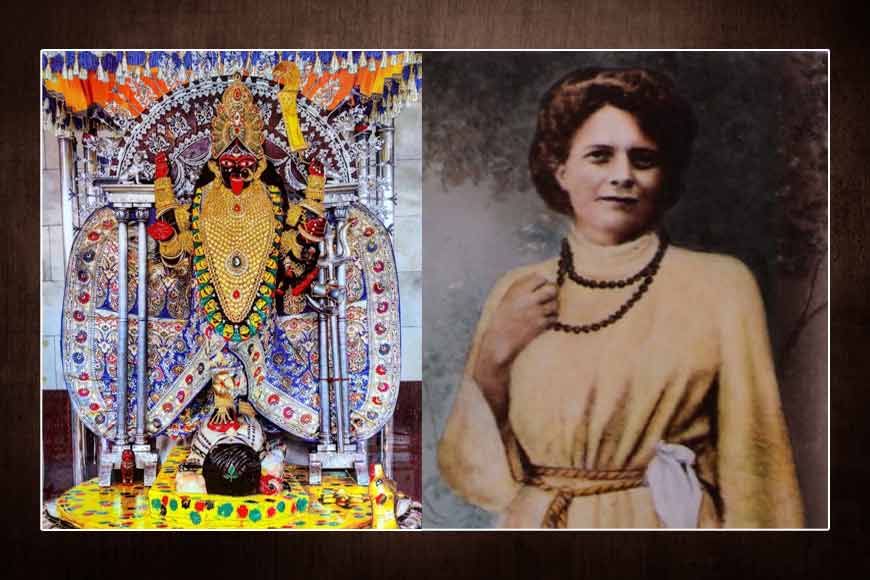Swami Vivekananda made ‘foreigner’ Nivedita give speeches on Kali despite criticism

India these days seems to be never short of religious controversies, latest being a short film poster showing Goddess Kali smoking. From political brickbats to social embargoes the news has hit the headlines. But little do we know that Swami Vivekananda himself was the eye of a social storm when he chose Sister Nivedita in the initial years of her initiation to give lectures on Goddess Kali. The then Hindu society was up in arms as they were not ready to hear a ‘foreigner’ or firangi talk about a Hindu Goddess. Swami Vivekananda always envisioned a different future for Nivedita. With her sincerity and commitment never in question, her ability to grasp his ideas, her eloquent prose, her gift of public speaking, the ease with which she could mingle with the Europeans and act as a bridge with the Brahmo elite in Calcutta, were a reason for appreciation and Swamiji had noticed all of these traits of Nivedita.
In 1896 in a letter to his benefactor and supporter Alasinga Perumal, Vivekananda writes: “to put the Hindu ideas into English and then make out of dry philosophy and intricate mythology and queer startling psychology a religion, which shall be easy, simple, popular and at the same time meet the requirements of the highest minds.” Vivekananda realized Nivedita would be the right person to carry forward his dreams as she created waves at the Albert Hall in Calcutta with her speech on Goddess Kali.
Her speech was a great success, so much so that various newspapers carried the review of her speech through favourable reviews. The Indian Mirror wrote: “It was a novel thing to hear an English lady speaking in support of Kali worship and her explanation was rational and philosophical, free from orthodoxy and bigotry. Nivedita was relieved that she could carry out the wishes of her Guru through the lectures and knew how ignorant even the educated English were about the symbolism in the Hindu religion.
The invitation to Nivedita to speak on Kali on 13th February 1899 had not only taken her by surprise but also ‘shocked’ the educated elite of Calcutta. For them Kali worship was associated with temple worship and the Goddess needed sacrifice of animals like goats. That was the idea of Goddess Kali they had. To boycott this speech no one was even ready to chair the meeting and even though the principal of Vidyasagar College, N. Ghosh, had previously agreed, he backed out in the last minute. However, that did not stop Nivedita or Vivekananda from going ahead with the speech. Rather Swamiji welcomed the opportunity so that he could get even with his detractors who had criticized his Kali worship despite his belief in Advaita or monotheism. Vivekananda was convinced that a speech on Kali by a foreign disciple and that too a woman will be a befitting reply to his critics. He had been barred by then in entering Dakshineshwar Kali Temple by the temple authorities and it was his beloved place where his guru Sri Ramakrishna Paramhansa had once been the priest.
Also read : Sister Nivedita’s lecture on Goddess Kali
Vivekananda took up this challenge seriously enough and briefed Sister Nivedita, even going through her prepared speech. The audience was huge, primarily because everyone was curious to know what a ‘foreign lady’ would say about Goddess Kali. Well known physician Dr Mahendranath Sarkar agreed to chair the meeting but he did raise many questions about regressive methods of worshipping Kali. Sarkar himself did not believe in idol worship and hence was opposed to several Hindu rituals. He started stealing the show so much with his own provocative take on the Goddess that many in the audience stood up calling him ‘an old devil.’ However Sister Nivedita very intelligently diverted the chaos and proceeded with her lecture with dignity and grace. She mixed her own world views with the teachings of Vivekananda and presented a completely different take on Indian Gods and Goddesses.
She started her speech with a disclaimer that said: “Without knowledge of Sanskrit or Indian history I am hardly suited to lecture on Kali, but I have the right as an English woman to publicly regret the vilification carried on by the British about this religious idea.” She said that instead it could be approached as a subject with a freshness of view and by drawing comparisons with another faith. She went on to speak about the three aspects of the Mother Goddess --- Durga, Jagaddhatri and Kali as embodiments of power and energy evolving to the final incarnation as Kali or Death bringing the ultimate freedom. She went on to say: “Religion is not something made for getlehood… to refine is to emasculate it.. God gave life, true. But he also kills. Let us face also and just as willingly, the terrible, the ugly, the hard.”
The depiction of the naked and violent Goddess Kali was against the accepted notion of a Hindu woman. But Nivedita explained how Kali depicted Maya and hence had to be painted as the non-woman as Maya itself is an unreal notion. Her real existence lay in Brahman and by going beyond her present form, she had to be realized as Brahmamayi, so eloquently sung in her praise by devotee Ramprasad.
The invitation to Nivedita to speak on Kali on 13th February 1899 had not only taken her by surprise but also ‘shocked’ the educated elite of Calcutta. For them Kali worship was associated with temple worship and the Goddess needed sacrifice of animals like goats. That was the idea of Goddess Kali they had.
Her speech was a great success, so much so that various newspapers carried the review of her speech through favourable reviews. The Indian Mirror wrote: “It was a novel thing to hear an English lady speaking in support of Kali worship and her explanation was rational and philosophical, free from orthodoxy and bigotry. Nivedita was relieved that she could carry out the wishes of her Guru through the lectures and knew how ignorant even the educated English were about the symbolism in the Hindu religion. She wrote: “Many thought that Kali was a real woman who killed her husband. Nivedita’s ‘King’ Swamiji was very pleased with the lecture and she was soon invited to speak on Kali in the Kali Temple of Kalighat that sort of bulldozed all the critics and highlighted the inclusiveness of the religion.
In her second Kali lecture Nivedita answered many questions raised, comparing the fearful image of Goddess Kali with the sombre and sinister visage of Mother Mary in Byzantine iconic paintings. Nivedita thus spoke of the need to recognize that divinity lay beyond form.
(Source: Margot --- Sister Nivedita of Vivekananda)










